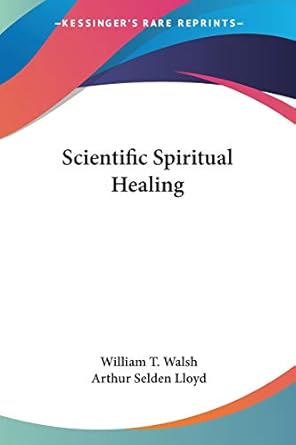The convergence of scientific and spiritual healing within the Baha’i teachings presents a profound paradigm shift, inviting individuals to explore health through a multifaceted lens that transcends traditional methodologies. This holistic approach underscores the importance of both material and spiritual factors in achieving optimal well-being. The Baha’i Faith, rooted in principles of unity and the interconnectedness of humankind, posits that true health cannot be delineated as merely the absence of illness but encompasses a richer tapestry of emotional, physical, and spiritual dimensions.
Historically, medicine has often been viewed through a singular lens: that of physical ailments, diagnoses, and treatments. However, the Baha’i view expands this paradigm by asserting that both the body and spirit are integral to the human experience, and that healing must address both aspects simultaneously. This synthesis of physical and spiritual healing is not merely a philosophical stance but is echoed in the teachings of Baha’u’llah, the founder of the Baha’i Faith, who advocated for a harmonious relationship between science and religion.
One of the central tenets of the Baha’i Faith is the concept of the oneness of humanity. The implications of this principle extend into the realm of health, wherein the interdependence of all people necessitates a collective approach to healing. This universality suggests that health disparities, often exacerbated by socio-economic divides and geographic barriers, require an egalitarian response grounded in love and solidarity. Baha’is believe that when individuals prioritize this interconnectedness, they cultivate a supportive environment conducive to healing.
The Baha’i teachings also emphasize the importance of education in promoting health. Knowledge is recognized as a pivotal factor that shapes individual and collective health outcomes. Through rigorous education, individuals are equipped with the necessary tools to understand health-related issues, recognize the interplay between their physical and spiritual states, and make informed choices that benefit both themselves and their communities. The Baha’i commitment to education thus serves as a catalyst for fostering health awareness and encouraging practices that align with both scientific understanding and spiritual principles.
In understanding the role of scientific inquiry, the Baha’i Faith does not regard science and religion as disparate entities but rather as two complementary paths leading towards truth. Scientific methods, grounded in observation and experimentation, play a crucial role in deciphering the intricacies of the human body and identifying effective medical treatments. Concurrently, spiritual healing, as articulated in Baha’i teachings, involves the nurturing of the soul through prayer, meditation, and virtuous actions. This dual approach fosters a deeper understanding of how physical ailments may be linked to emotional and spiritual conditions.
Moreover, the Baha’i Faith elucidates the necessity of cultivating virtues such as compassion, patience, and humility, which serve as foundational elements for both personal health and the broader sociocultural environment. The exercise of these virtues can mitigate stress and anxiety, enhance emotional resilience, and foster communal harmony, all integral components of a healthy society. As such, in the Baha’i view, personal health extends beyond individual capacity; it involves contributions to the wellness of the community, thereby amplifying the effects of both scientific and spiritual healing.
A poignant illustration of the application of these principles can be found in the Baha’i approach to mental health. Recognizing that mental and emotional challenges often arise within the complex web of social interactions and spiritual disconnection, the Baha’i teachings advocate for comprehensive strategies that include psychotherapy, community support, and spiritually-oriented practices. This holistic view encourages individuals to seek professional help while also engaging in personal spiritual development, thereby fortifying their mental well-being.
Furthermore, a distinctive aspect of Baha’i teachings on health is the acknowledgment of the transformative power of prayers and spiritual practices. Baha’is believe that prayer not only fosters a sense of connection with the divine but also serves as a means to attain inner peace and clarity. This spiritual practice can facilitate healing by alleviating fears, fostering hope, and creating an atmosphere conducive to recovery. In essence, spiritual healing offers a counterbalance to the often mechanistic view of healthcare, reminding individuals that there exists a realm beyond the fine print of prescriptions and medical jargon.
Engaging in community service and charitable endeavors is another manifestation of the Baha’i commitment to health. The act of giving generates feelings of purpose and fulfillment, which are paramount to maintaining psychological wellness. Through service, individuals not only uplift their own spirits but also contribute to the collective health of their communities, reinforcing the interconnectedness that lies at the core of the Baha’i teachings.
As the world grapples with burgeoning health crises, such as pandemics and mental health challenges, the Baha’i perspective on health provides a compelling framework for addressing these issues. By marrying empirical research and spiritual development, individuals can embark on a journey towards holistic health that honors both human dignity and the scientific quest for understanding. Ultimately, the Baha’i view posits that true healing is a symphony of physical, emotional, and spiritual wellness, suggesting that the future of health must embrace this intricate nexus to foster a more vibrant, unified humanity.
In conclusion, the Baha’i teachings on scientific and spiritual healing redefine the conceptualization of health. They challenge individuals to shift their perspectives, embrace curiosity, and explore the interconnections that shape human well-being. By doing so, it becomes possible to cultivate an environment of healing that transcends mere treatment, fostering holistic health for individuals and communities alike.
